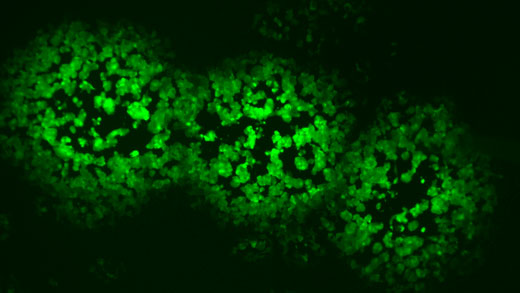
The overarching research goal of the Yang laboratory is to understand the mechanisms governing viral replication, with the rationale that the discoveries will expand the knowledge of both viruses and their hosts and facilitate the development of novel strategies to combat viral and non-viral diseases. A parallel goal of Yang lab is to provide a highly supportive environment to train the next generation of scientists.
Poxviruses significantly impact public health, with many presently causing morbidity and mortality in humans and many economically important animals, including deadly zoonotic pathogens (e.g., mpox virus). In addition, despite eradicating smallpox, one of the most (if not the most) devastating diseases in human history, smallpox resurgence remains a serious biothreat. Poxviruses are also widely developed as veterinary and human vaccine vectors and as cancer treatment agents. Poxviruses provide numerous precious tools to understand many aspects of cell biology and dissect complex life processes. Their large DNA genomes encode hundreds of genes that engage many key nodes of cellular life.
The ongoing research in the Yang lab focuses on how poxviruses interact with two cellular housekeeping processes: protein synthesis and metabolism. We also develop novel antivirals against mpox virus and poxviruses-based utilities.
List of publications can be found in my NCBI Bibliography or Google Scholar:
Selected Publications
- Yang Z*. Monkeypox: A potential global threat? J Med Virol. 2022 Sep;94(9):4034-4036. doi: 10.1002/jmv.27884. Epub 2022 Jun 2. PubMed PMID: 35614026; PubMed Central PMCID: PMC9283296.
- Rothenburg S, Yang Z, Beard P, Sawyer SL, Titanji B, Gonsalves G, Kindrachuk J. Monkeypox emergency: Urgent questions and perspectives. Cell. 2022 Sep 1;185(18):3279-3281. doi: 10.1016/j.cell.2022.08.002. Epub 2022 Aug 10. PubMed PMID: 35998628; PubMed Central PMCID: PMC9395144. Invited Voice article
- Cao S, Molina JA, Cantu F, Hernandez C, Yang Z*. A Poxvirus Decapping Enzyme Colocalizes with Mitochondria To Regulate RNA Metabolism and Translation and Promote Viral Replication. mBio. 2022 Jun 28;13(3):e0030022. doi: 10.1128/mbio.00300-22. Epub 2022 Apr 18. PubMed PMID: 35435699; PubMed Central PMCID: PMC9239241.
- Pant A*, Dsouza L, Yang Z*. Alteration in Cellular Signaling and Metabolic Reprogramming during Viral Infection. mBio. 2021 Oct 26;12(5):e0063521. doi: 10.1128/mBio.00635-21. Epub 2021 Sep 14. PubMed PMID: 34517756; PubMed Central PMCID: PMC8546648.
- Pant A, Cao S, Peng C, Yang Z*. Viral Growth Factor- and STAT3 Signaling-Dependent Elevation of the TCA Cycle Intermediate levels During Vaccinia Virus Infection. PLoS Pathog. 2021 Feb 2;17(2):e1009303. doi: 10.1371/journal.ppat.1009303. eCollection 2021 Feb. PMID: 33529218.
- Cantu F, Cao S, Hernandez C, Dhungel P, Spradlin, Yang Z*. Poxvirus-encoded decapping enzymes promote selective translation of viral mRNAs. PLOS Pathog. 2020 16(10): e1008926. https://doi.org/10.1371/journal.ppat.1008926.
- Pant A, Cao S, Yang Z*. Asparagine Is a Critical Limiting Metabolite for Vaccinia Virus Protein Synthesis during Glutamine Deprivation. J Virol. 2019 Jul 1;93(13). doi: 10.1128/JVI.01834-18.
- Dhungel P, Cao S, Yang Z*. The 5′-poly(A) leader of poxvirus mRNA confers a translational advantage that can be achieved in cells with impaired cap-dependent translation. PLoS Pathog. 2017 Aug 30;13(8):e1006602.
- Dai A, Cao S, Dhungel P, Luan Y, Liu Y, Xie Z*, Yang Z*. Ribosome Profiling Reveals Translational Upregulation of Cellular Oxidative Phosphorylation mRNAs During Vaccinia Virus-induced Host Shutoff. J Virol. vol. 91 no. 5 e01858-16, 2017
- Yang Z, Bruno DP, Martens CA, Porcella SF, Moss B*. Simultaneous high-resolution analysis of vaccinia virus and host cell transcriptomes by deep RNA sequencing. Proc Natl Acad Sci U S A. 107(25):11513-8, 2010.
